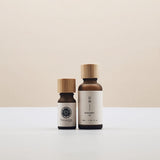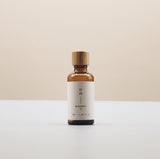Bergamot Essential Oil
Botanical name: Citrus Bergamia
Ingredient: 100% Pure essential oil
Extraction method: Cold pressing method
Country of Origin: Sicily
Aroma: Citrus
Blends well with Lime, Lemongrass, Lemon, Orange
Handcrafted in small batches in Singapore
Folklore and Herbal Heritage
Some controversy exists about the origin of the word bergamot. According to one story, the name originates from the Turkish word beg-armudu, meaning “prince's pear.” Another account claims that it comes from the name of the small town of Bergamo in northern Italy, supposedly the site of the original distribution of bergamot oil in Italy.
Early tales credit Christopher Columbus with transporting bergamot from the Canary Islands to Italy, where it has been cultivated ever since. Bergamot was virtually unknown to the rest of the world until relatively recently, and therefore most of the folklore concerning bergamot comes to us from Italy. Italians used it to cool and relieve fevers and protect against malaria. They took it internally to expel intestinal worms. Italians valued bergamot for its antiseptic actions. French perfumers enlivened fragrances, particularly Eau de cologne, with the sweet citrus notes of bergamot. It imparts a delightful flavour and distinctive aroma to Earl Grey and Constant Comment teas.
Medicinal Uses
Bergamot oil possesses strong antiseptic properties, making it useful against urinary tract infections such as cystitis and urethritis. Using it in Sitz baths helps to prevent bacterial infections from spreading from the urethra to the bladder. Bergamot oil's antiseptic properties also alleviate respiratory ailments. It cools fevers, subdues the symptoms of colds and flu, and soothes sore throats, tonsillitis, and laryngitis. As a digestive aid, bergamot oil calms stomach cramps and regulates the appetite, either stimulating or suppressing it as needed.
Bergamot is useful in treating chronic fatigue syndrome. When used as an inhalant or in a lamp or diffuser, bergamot oil can help people who wish to break the smoking habit. Bergamot oil fights fatigue from stress, helps restore physical and emotional strength, and is useful for restoring immunity in a person convalescing from a long illness. Applied topically, bergamot oil can minimize the discomfort and hasten the healing of cold sores and other herpes infections, as well as mouth ulcers.
Beauty Benefits
Bergamot oil's antiseptic action makes it useful for the treatment to face and skin infections. Its astringent quality helps regulate excessive oiliness of the skin or scalp. Its deodorizing action can freshen your body, your home, or your office. Bergamot oil compresses help draw out the inflammation of blemishes or boils and promote rapid healing. Bergamot also repels insects and soothes insect bites. Along with neroli, orange, and rosemary, bergamot was a component of the original Eau de cologne Modern perfumers prize it for the fruity floral bouquet it imparts to their creations.
Emotional Effects
Bergamot oil is refreshing and uplifting. It acts as a stimulant and tonic to balance the emotions and nerves. Research conducted in Italy indicates that bergamot oil relieves feelings off ear, anxiety, and panic. It diminishes depression and sadness. It can calm aggression and anger. Its soothing nature encourages the release of resentment and forgiveness through the beneficial expression of repressed emotions that distort perception and interfere with health. Smelling bergamot oil can stabilize a person in a shaky emotional state. It evokes feelings of happiness and joy and can restore self-confidence and self-esteem. Bergamot's balancing properties help minimize the tendency toward compulsive or obsessive behaviour. During times of sadness or grief, bergamot oil helps to heal emotional wounds and can inspire or restore loving feelings.
Other information
Lush green leaves and tiny white star-shaped flowers cover the branches of the bergamot tree, which can attain a height of sixteen feet. It bears appear shaped yellow fruit that is smaller than an orange and was once called the bergamot pear. The bergamot tree is the result of the cross-breeding of the lemon tree and the bitter orange tree, which created the bergamot hybrids Citrus bergamia and Citrus aurantium, subspecies bergamia.
A member of the Rutaceae family, bergamot originated in tropical Asia. Farmers in most countries have had little or no success in cultivating the tree commercially. Today, bergamot grows in the Ivory Coast in Africa, in the Calabria region of Italy, and in Sicily. It has a flowery lemon-orange smell with a slightly sweet, balsamic undertone. The best quality oil is hand-pressed. Peels from 1,000 bergamot fruits yield about 30 ounces of oil.
Precautions
Bergamot oil promotes sensitivity to the sun. Avoid wearing it outdoors in sunlight to prevent sunburn or uneven darkening of the skin.
















